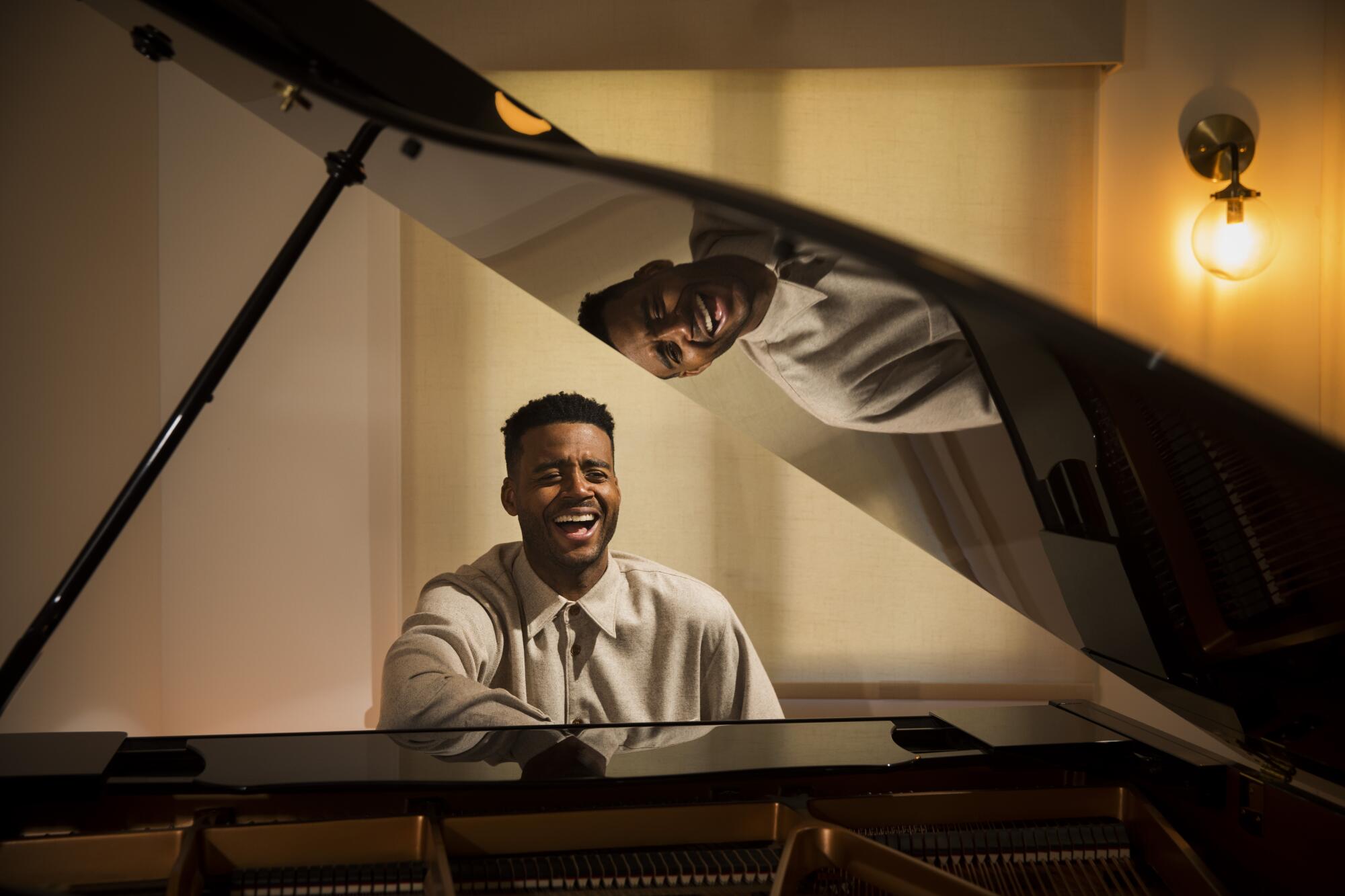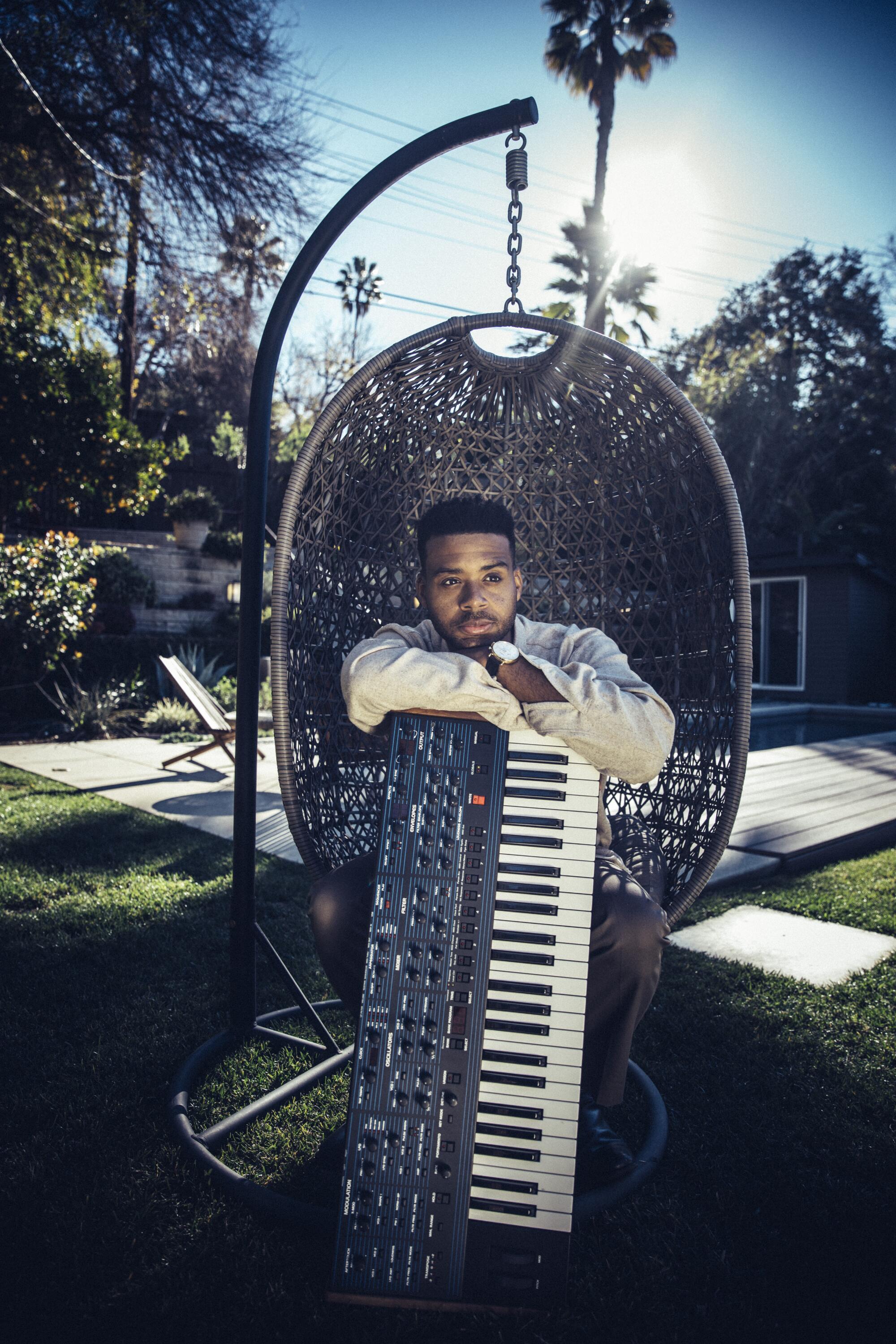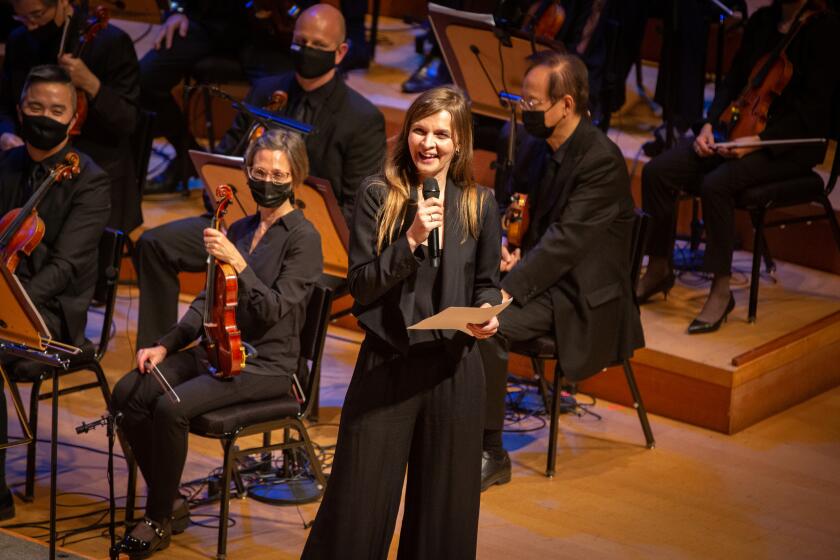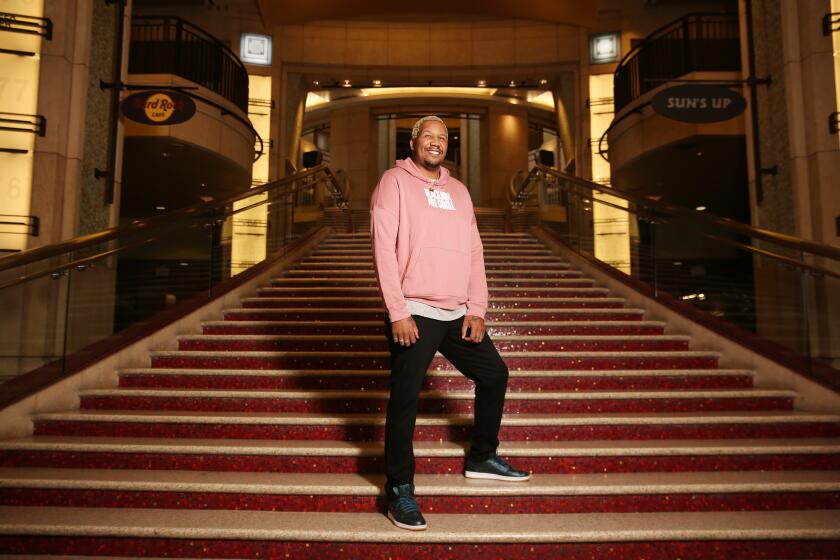
- Share via
Richard Williams, as portrayed by Will Smith in the movie “King Richard,” often repeats a line to his daughters, future tennis superstars Venus and Serena. “If you fail to plan, you plan to fail.” Kris Bowers, composer of the film’s fizzy, blood-pumping score, heard the gist of that message from his own father throughout his childhood.
Bowers tells me this while he’s at the wheel of his SUV, sporting a black “Space Jam: A New Legacy” cap and a white N95 mask. We just left his new house in the hills of west Pasadena, trickling down toward the 110 to begin a three-hour tour of his Los Angeles — the city where he learned to excel at jazz piano as well as how to navigate both Black and white spaces as a young man. After several years away in New York City, he returned six years ago and swiftly conquered Hollywood.
For the record:
2:03 p.m. Feb. 9, 2022An earlier version of this story misspelled Kris Bowers’ mother’s name. It is Kimberle Bowers, not Kimberly Bowers.
The 32-year-old composer had an explosive year in 2021. His neoclassical music was heard in 82 million homes as people streamed “Bridgerton,” one of the most watched series on Netflix to date, and he scored three major films about larger-than-life Black American figures: “The United States vs. Billie Holiday,” the Aretha Franklin biopic “Respect” and “King Richard.” He and his grandfather, Horace, were also the subjects of the documentary “A Concerto is a Conversation.”
Bowers’ big year culminated in a concert of his music performed by the L.A. Phil in November, including the premiere of a new horn concerto performed by the Phil’s Andrew Bain. (He also bought the house in Pasadena and found out he was going to be a father.) Ever critical of himself, he mostly sees what could have gone better at that concert — but “I feel like any time people are emotionally moved,” he says, “then it was successful on some level.”
It’s fitting that our first stop, after leaving Pasadena, is down Grand Avenue — past Walt Disney Concert Hall, which wasn’t there when he was a kid — to the Colburn School. He took music lessons there, concentrating on jazz, from the time he was 8 until he left home for college at Juilliard. He had raw talent and enormous discipline, according to his longtime jazz piano teacher, Donald Vega.
“Jazz is not easy, because it’s a lot more complex, and deals with improvisation,” says Vega, who left Colburn in 2005. “And he was very fast at not just getting the concept, but putting his own thing on it and having that risk. You have to have this element of risk when you’re improvising.”

When Colburn’s Grand Avenue campus opened in the summer of 1998, Bowers was one of the school’s first students, spending every Saturday there taking classes from 9 a.m. to 3 p.m. He would often meet up with his family for lunch, either at the California Pizza Kitchen or the now-gone Koo Koo Roo on Figueroa Street, before heading back to class.
“My dad always wanted to talk to my teachers, especially my private instructors, just to get a clear understanding of how I was doing and what I needed to work on,” Bowers says, taking a right on West 5th Street.
Bowers says his father, Eric, a former TV writer on “Kenan & Kel,” was like the Richard Williams of piano. Just as Williams had a hyper-detailed plan for his daughters to thrive on the (predominantly white) tennis courts, Mr. Bowers set his son on a path toward musical excellence; he was exacting, on both Kris and his teachers.
His mother — Kimberle, a retired HR executive at DirecTV — played music while Kris was in utero. Eric Bowers remembers emphasizing a particular song he’d fallen in love with — “Leaves on the Seine” by David Lanz — and telling his wife: “One day this child is going to play this song for us in person.”
“That just became a thing with us,” Eric says. “It was a vision that started back then.”
Kris Bowers says his parents were exacting, and expected intense discipline in music studies and a high bar at school. Once he came home with a C on a test, while at the prestigious Los Angeles County High School for the Arts on the Eastside, and argued with his father that it was fine because a C isn’t failure, it’s average. “[My dad] literally drove me downtown to skid row and was like, ‘Get out of the car,’” Bowers says. “He’s like, ‘If you want to be average, this is what you’re aspiring to.’”
Says Eric: “My parents were hard-working people, and they were glad I went to school. But the expectation to do well was not there — the expectation to show up was there. I wanted more for my kids. I did want them to excel.”
Eric and Kimberle, now about to celebrate their 40th anniversary, were a united front in their rigorous plan for Kris. That plan included enrolling him in competitions from a young age. We’re now standing in front of the Dorothy Chandler Pavilion, where Kris once took second place in the finals for the Spotlight Awards — the Music Center’s showcase for L.A. high school artists. Second place came with a monetary prize, but top honors went to his childhood friend, Victor Gould. Bowers says his dad would often point to Gould and say things like, “Well, Victor got three solos, you only got two,” as a way to make Kris more competitive.
An unconventional event last weekend focused on the cinematic worlds that composers Hildur Guðnadóttir, Kris Bowers and Nicholas Britell have created through sound.
By the time he got his driver’s license, Bowers was playing gigs with his teachers in Glendale or sitting in with the best up-and-coming jazz players — like Ambrose Akinmusire and Walter Smith III — at the Mint on Pico Boulevard. He got a full scholarship to Berklee College of Music but decided to go to Juilliard instead, where there was a better ratio of teachers to fewer students. By the time he left for college, Bowers had accumulated somewhere between $25,000 to $40,000 in competition prize money — which he used to support himself in New York.
He earned a bachelor’s and then a master’s degree in jazz studies at Juilliard. In 2011, still in graduate school, he took first prize in the Thelonious Monk Institute of Jazz International Piano Competition, which landed him a record deal with Concord Jazz. Aretha Franklin, whose dramatized story he would score 10 years later, was in the audience and was so impressed with Bowers that she sought him out after his performance. Franklin called him a few weeks later and asked him about his career plans — offering her publicist to be his first manager, who then landed Bowers his first film-scoring gig, for a documentary about the late actress Elaine Stritch.
His parents’ prodding certainly helped Bowers’ trajectory as a young musician, though it occasionally caused friction. In the car, Bowers tells me about how once, when he was 15, the constant pressure and focus on competition led to an argument with his father. His teacher at LACHSA, the pianist and composer Gerald Clayton, encouraged a more emotional approach — achieved partly through singing while improvising. This unlocked music in a new way for a teenage Kris, where he could emphasize expression over technique. He leaned into this new mindset while preparing for yet another competition, but it didn’t go over well with his first audience and toughest critic.
“My dad kept feeling like I wasn’t doing something impressive enough — it wasn’t flashy enough,” Bowers says. “And I was fighting with the fact that I wasn’t aiming to do that. I was aiming to try and practice improvising so that I could do it in real time, in a way that felt like it was authentic.”
After that fight, his father stopped giving so much input. “It was an interesting moment for us,” Bowers says, “this difference in mentality where he felt like I was no longer aspiring to be this cutthroat, competitive person, and was being a bit too soft, I think, in a lot of ways. I think it took him a while to feel like that approach was actually the right approach.”
Today, Eric sees that as the moment when musical excellence became a fire lit within Kris and not something he felt he had to keep fueling.

We’re going east on the 10 now, heading to the dry cleaning business that Kris’ grandfather, Horace Bowers, started 60 years ago on Central Avenue in South L.A. The city recently named the area Bowers Retail Square in his honor.
On our way there, Bowers mentions that, in high school, he wanted to become an animator and work for Pixar. For a while he went to a cartooning school on weekends in the San Fernando Valley. He got to scratch that itch a little by scoring last year’s cartoon-heavy “Space Jam” sequel — and even though he doesn’t draw anymore, he still relies on visuals for emotional inspiration.
Bowers spent many childhood hours at Bowers & Sons Cleaners, doing homework or waiting for a ride home with his grandparents. There’s a mural of his grandfather on the side of the building, which was painted recently, during last year’s Academy Awards season when a documentary about Kris and Horace was up for an Oscar. In the film, “A Concerto is a Conversation,” the elder Bowers tells the story of leaving the Jim Crow South and coming to the more subtly discriminatory Los Angeles in the 1950s, where he started from nothing and overcame many hurdles to achieve business success.
Bowers’ grandparents were a major presence in his life, he tells me, as we head west down Martin Luther King Boulevard toward where he grew up, off of Crenshaw. They came to all of his shows and helped pay for Colburn when money was tight at home.
Kristopher Bowers was born in Compton — or “Carson-adjacent” as his parents liked to say — but when he was about 2 the family moved to Mid-City. He grew up on a street buttressed by a wall that overlooks the 10, and his parents weren’t pleased when the people at Spotlight announced he was from South Central. The Bowerses were clear “that when the L.A. riots happened, [they] only went up to Adams,” Kris remembers, “which is only on the other side of this freeway, and that became the line of what’s South Central.”
Even though there was a library nearby, his parents drove him 30 minutes to the one in Beverly Hills, where he did lots of reading and attended summer camps — one part of their constant aspiration for him to be in “better spaces,” as Bowers’ parents put it.
He attended elementary school in Hancock Park, where he was able to enroll by using his great-uncle’s home address. Horace’s brother, Mirion, was one of the first Black men to move into the neighborhood, and he was the first Black member of the Wilshire Country Club. He received death threats and flaming bags of poop on his doorstep. Kris recalls that Third Street Elementary had a sizable Korean demographic when he attended, but when he moved on to John Burroughs Middle School, he was surrounded by Black students. At Burroughs, Bowers’ parents made sure he was in the magnet program, where he was once again the odd man out.
“This is the school,” he says as we drive past John Burroughs, “where I was called an ‘Oreo,’ or I was talked about not really being Black because I talked a certain way, or, like, cared about education. It was definitely an immersion into Black culture in a way where I hadn’t had before. It was at that school that I started wearing XXX T-shirts and wearing FUBU and Phat Farm and Timberland boots, and watching rap music videos. I definitely absorbed and loved being around that aspect of Black culture.”
We pass Roscoe’s Chicken and Waffles on Pico, where Bowers likes to take his grandfather for breakfast. After swinging by his Mid-City childhood home — his parents still live there, and his grandparents live five minutes away — we drive past the preschool where he started his education a year earlier than his classmates. Taylor-Tot Playhouse was run by a Black woman named Alvalois Taylor, who Bowers says was someone “at the foundation of the way my parents saw the importance in education.”
Oscar-nominated shorts directors Kris Bowers and Travon Free are enjoying the spotlight, and the chance to tell meaningful stories about Black lives.
We’re going south again, across the 10 into what used to be “South Central” but in 2003 was rebranded to “South Los Angeles” by the L.A. City Council in an effort to reduce stigma and crime. Bowers points to the old Crenshaw Mall and notes how it’s going to be turned into a posh, Galleria-style center. His grandfather, and later his parents, got into income property management and owned several apartments around this part of town.
After spending a decade in New York, at Juilliard and then playing and touring, Bowers came home in 2016. He was 27 and didn’t want to live in his childhood bedroom, so he took a small apartment his parents owned in Leimert Park and transformed it into a little music studio where he often slept.
At the time, he was scoring the documentary “Kobe Bryant’s Muse,” which Bryant produced. Bowers recalled that the basketball star treated it like a master’s degree in filmmaking, which he turned into a second career, and it was Bryant who encouraged Bowers to move back to L.A. and even join his creative team in Newport Beach. The latter didn’t happen, but they were working on another project together when Kobe died in early 2020.
After that documentary aired in 2015, Bowers’ scoring career took off. He quickly found himself working with the likes of Justin Simien (“Dear White People”) and director Ava DuVernay, who recognized in Bowers “the pixie dust of passion,” she says, “which is something that can’t really be taught, and it can’t be manufactured.” His latest score for her, also composed in 2021, was the Netflix series about Colin Kaepernick, “Colin in Black & White.”
“He brought a real internal quality to the music,” DuVernay says of Bowers, “that isn’t what most of the composers who had wanted to do the project were even talking about. They were talking more about the muscularity of a project about a football player. ... And with Kris, it was very much more honed in on the interior life of a person who was connected to something that he enjoyed, but that what he enjoyed is inside of a larger system that he had to consider, and what happens when your love of a thing is kind of trapped inside a system that you can’t quite navigate.”
Bowers next drives us by the World Stage, a performance center started by the late jazz drummer Billy Higgins and one of the places where young Kris could first see his future as a career musician. We go on past Crenshaw United Methodist Church, where he, at age 12, started winning competitions with cash prizes. This particular contest was run by the National Association of Negro Musicians.
“It’s always fascinated me, how much my parents made it a priority that they wanted me to be in different spaces,” Bowers says as we end our odyssey into the past and start heading back to Pasadena. “Part of that’s sad to me, just that we didn’t have what they felt I needed. But a part of me feels so appreciative ... like, the amount of miles they probably put on their cars, just taking me to schools and classes and competitions and all that stuff — it’s pretty impressive.”
The homework that film composer and music mentor Kris Bowers had to do before taking on his latest assignment speaks volumes about the unique niche in contemporary American music that pianist Don Shirley carved out for himself more than a half-century ago.
Bowers and his wife — actress Briana Nicole Henry — found out they were expecting while he was in the midst of his marathon year. He’s asked for a slight reprieve from his busy schedule when the baby is due in March, but other than that his dance card is full through March 2023: “Bridgerton” Season 2, another Shonda Rhimes show called “Inventing Anna” about the influencer-era scammer Anna Delvey, the DuVernay project “DMZ,” a Marvel project for Disney+ and “The Haunted Mansion” with Simien. He also plans to release more music of his own.
After Eric Bowers saw “King Richard,” Kris asked him what he thought of the film. “My dad was like, ‘I mean, I was pretty much just watching my life. Pretty much just watching myself.’” Kris laughs.
Eric has heard his adult son suggest that he pushed too hard at times, “that I was kind of a taskmaster,” he says. “At the time, I didn’t think so. I had justifications that he had to push himself to be the best. ... It may have been a little pushy, but I think it had its own rewards.”
When he was in high school, Kris Bowers did play “Leaves on the Seine” for his parents. They both cried.
More to Read
The biggest entertainment stories
Get our big stories about Hollywood, film, television, music, arts, culture and more right in your inbox as soon as they publish.
You may occasionally receive promotional content from the Los Angeles Times.












